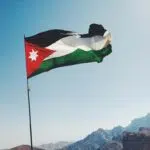Jordan’s Independence Day is celebrated on May 25 every year, and is the most important event in the history of Jordan, as it commemorates its independence from the British government. After World War I, the Hashemite Army of the Great Arab Revolt took over the area which is now Jordan. The Hashemites launched the revolt, led by Sharif Hussein, against the Ottoman Empire. The Allied forces, comprising Britain and France supported the Great Arab Revolt. Emir Abdullāh was the one who negotiated Jordan’s independence from the British. Though a treaty was signed on March 22, 1946, it was two years later when Jordan became fully independent. In March 1948, Jordan signed a new treaty in which all restrictions on sovereignty were removed to guarantee Jordan’s independence. Jordan joined and became a full member of the United Nations and the Arab League in December 1955.
History of Jordan Independence Day
The first appearance of fortified towns and urban centers in the land now known as Jordan was early in the Bronze Age (3600 to 1200 B.C.). Wadi Feynan then became a regional center for copper extraction with copper at the time, being largely exploited to facilitate the production of bronze. Trading, migration, and settlement of people in the Middle East peaked, thereby advancing and refining more and more civilizations. With time, villages in Transjordan began to expand rapidly in areas where water resources and agricultural land abound. Ancient Egyptians then later expanded towards the Levant and would eventually control both banks of the Jordan River.
There was a period of about 400 years during which Jordan was under the rule and influence of the Ottoman Empire, and the period was characterized by stagnation and retrogression to the detriment of the Jordanian people. The reign of the Ottoman Empire over Jordan would eventually cease when Sharif Hussein led the Hashemite Army in the Great Revolt against the Ottoman Empire, with the Allies of World War I supporting them. In September 1922, the Council of the League of Nations recognized Transjordan as a state under the terms of the Transjordan memorandum. Transjordan remained under British mandate until 1946, when a treaty was signed, with eventual sovereignty being granted upon signing a subsequent treaty in 1948.
The Hashemites’ assumption of power in the Jordan region came with numerous challenges. In 1921 and 1923, there were some rebellions in Kura which were suppressed by the Emir’s forces, with British support. Jordan is generally a peaceful region today, and it has become quite a tourist destination in recent times.
Jordan Independence Day timeline
Fortified towns and urban centers begin to spring up in the area now known as Jordan.
In 1922, the Council of the League of Nations recognizes Jordan as a state under the Transjordan memorandum.
In 1946, Emir Abdullāh negotiates the first independence treaty with Britain which would later lead to Jordan's ultimate independence in 1948.
Jordan becomes a member of the United Nations and the Arab League in 1955.
Jordan Independence Day FAQs
What day is Jordan’s Independence Day?
Jordan’s Independence Day is May 25, every year. It marks the anniversary of the treaty that gave Jordan her sovereignty.
When did Jordan become independent?
On May 25, 1948, Jordan officially became an independent state.
Who is Jordan’s current leader?
The current ruler Of Jordan is the monarch, Abdullah II bin Al-Hussein, King of Jordan.
How to Observe Jordan Independence Day
Light up some fireworks
One of the hallmark celebrations of any independence day is the show of fireworks. Be sure to be a part of the beauty!
Prepare some mansaf
As you probably already knew, Mansaf is Jordan’s national dish. As such, preparing it on such a special day as Independence Day is a brilliant idea.
Share on social media
Take pictures and videos of you in your dishdasha celebrating Independence Day. Share them on your social media!
5 Interesting Facts About Jordan
Home to the Dead Sea
The Dead Sea, which is the lowest point on Earth, is located in Jordan.
A nexus between Africa, Europe, and Asia
Jordan is a pivotal point connecting Africa, Asia, and Europe.
Over 100,000 archeological sites
Jordan has over 100,000 archeological and tourist sites.
The world’s oldest dam
Jordan is home to the world’s oldest dam, the Jawa Dam.
Jesus was baptized in Jordan
Jesus, who is the symbolic character of the Christian faith, was baptized in the Jordan River before beginning his ministry.
Why Jordan Independence Day is Important
Jordan is peaceful and liberal
Though a generally conservative country, Jordan is relatively liberal. The country is peaceful and tolerant of foreign cultures.
The weather in Jordan is nice
Jordan is a warm region. The weather is usually warm and pleasant at all times of the year.
Jordan is a tourist’s dream
Jordan has everything a tourist could dream of. Beautiful sights, calm weather, a welcoming culture, and amazing people make it a fantastic place for tourists.
Jordan Independence Day dates
| Year | Date | Day |
|---|---|---|
| 2026 | May 25 | Monday |
| 2027 | May 25 | Tuesday |
| 2028 | May 25 | Thursday |
| 2029 | May 25 | Friday |
| 2030 | May 25 | Saturday |































